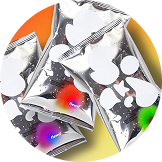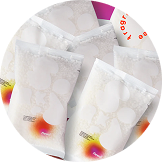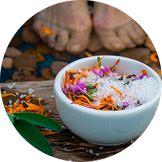You’ve told people you’re exhausted and they say you need more rest. What they don’t understand is no amount of sleep seems to make a difference in how you feel. Is it possible you’re not tired, but you’re fatigued? We’re here to help you find out.
Wait, is there a difference between fatigue and tiredness? Big time. Many people don’t realize it, though, so we wanted to create this comparison of fatigue vs tired to make it clear which you’re dealing with.
Being tired is totally normal. It could be caused by poor sleep (or not enough sleep), dietary issues, or potentially just doing too much physically and mentally without ample recovery.
Fatigue, on the other hand, is a chronic condition that’s usually linked to a more serious underlying problem. It could be hormonal imbalances, inflammation, nutrient deficiencies, or some more serious condition.
So you’ll probably feel tired when you’re fatigued, but it’s not as simple as getting more rest. Don’t worry - after helping you differentiate between feeling fatigue vs tired we’ll share strategies so you can regain control of your life once again.
It could be as simple as adding one of our magnesium bath soak formulations to your self-care ritual. These bring you the most bioavailable magnesium alongside proven vitamins and nootropics to ease nervous system overload and support better physical/mental recovery.
Don’t keep running on fumes. Feel better fast with Flewd Stresscare!
| Tiredness | Fatigue | |
|---|---|---|
| Cause | Usually due to lack of sleep, overexertion, or temporary stress | Often rooted in chronic conditions, hormonal imbalance, nutrient depletion, or inflammation |
| Relief From Rest | Improves after sleep, naps, or taking a break | Doesn't fully improve with sleep or rest alone |
| Duration | Short-term and situational | Persistent or long-lasting, even after lifestyle adjustments |
| Physical Symptoms | Heavy eyelids, yawning, low energy | Muscle weakness, body aches, constant exhaustion, mood disorders |
| Mental Impact | Usually able to focus and function after rest | Brain fog, low motivation, poor concentration despite rest |
| What Helps | Sleep, hydration, reduced activity | Addressing underlying imbalances, targeted recovery practices, and nervous system support |
Common Causes of Tiredness
Everyone feels tired on a regular basis - at least, anyone who has a real job or responsibilities to handle on a daily basis. It’s a totally normal response to physical activity, a long day, or simply not getting enough rest.
You might feel heaviness in your body, droopy eyelids, or the urge to crawl into bed. The key difference is being tired is a short-term condition that improves with rest. Energy returns when you get the necessary recovery.
Not Enough Sleep or Poor-Quality Sleep
Sleep is the foundation of energy - and human health as a whole, for that matter. This is the most common culprit behind tiredness. Your body (and mind) just isn’t getting enough time to recover when your sleep is light or interrupted.
This leads to grogginess and low energy the next day, even if you technically hit 7-8 hours in bed. After all, it’s not just about how many hours you clock in - it’s how RESTORATIVE your sleep is.
Mental Exhaustion and Overstimulation
Too much screen time, multitasking, and emotional stress can wear your brain out. It doesn’t always feel like physical exhaustion. Instead, you might notice irritability or low focus.
You could spend all day working at your desk and still feel drained by the end of your shift. That’s because mental stimulation takes energy just as much as physical exertion does.
Dehydration or Nutrient Depletion
Your cells can’t function efficiently without enough water and electrolytes. Even mild dehydration leads to tiredness, headaches, and sluggishness. The same goes for missing nutrients like iron, magnesium, and potassium. Each is a key player in energy production.
Physical Overexertion
Of course, pushing yourself too hard at the gym or during work physically drains your muscles and depletes your glycogen stores. This kind of tiredness often comes with soreness, heaviness, or reduced motivation to keep moving.
Common Causes of Fatigue
Now, let’s talk about the other half of our fatigue vs tired comparison. Contrary to what many assume, feeling fatigued isn’t just “being REALLY tired.” It’s a more persistent sense of exhaustion that doesn’t go away, even with more rest.
People with fatigue often describe it as hitting a wall mentally, physically, or both. It can linger for weeks or even months and usually points to something deeper going on inside the body.
Hormonal Imbalances (Thyroid, Adrenal Dysfunction)
Your body struggles to generate energy when your thyroid is underactive or your adrenals are dysregulated from chronic stress. Each of tehse systems plays a role in controlling your metabolism and stress response. Fatigue shows up fast when they’re off.
Chronic Inflammation and Underlying Medical Conditions
Low-grade inflammation from conditions like autoimmune diseases, PCOS, or long COVID can get in the way of your cells functioning how they’re supposed to.
As a result, your body has no choice but to divert energy toward damage control, leaving less available for basic tasks like thinking clearly or feeling physically motivated.
Nutrient Deficiencies (Iron, Magnesium, B12, etc.)
Just like feeling tired can be traced back to poor nutrition, chronic fatigue is linked to nutrient deficiencies as well. Only in this case, it’s a much more advanced issue that’s formed over time.
Energy is made inside your cells, and that takes a lot of key nutrients. For instance:
- Iron helps move oxygen through the body.
- Magnesium regulates muscle and nerve function.
- B12 supports nerve health and red blood cell production.
Deficiencies in any of these can result in chronic, unexplained fatigue. The problem is a lot of them are hard to get through diet and supplementation. That’s where the magnesium bath benefits come into play, as we’ll explore later on.
Poor Mitochondrial Function and Nervous System Dysregulation
Your mitochondria are like your body’s battery packs. Your whole system slows down when they’re underpowered, be it because of stress, poor diet, toxins, or illness. Add in a constantly activated nervous system, and your body never truly rests. The result is deep, lingering fatigue.
Fatigue vs Tired: What’s the Difference Between Fatigue and Tired?
At first glance, fatigue and tiredness feel similar. You’re low on energy, not functioning at your best, and craving rest. Here’s the key difference between fatigue and tired, though: tiredness goes away with rest while fatigue doesn’t.
That alone should make it easy for you to figure out which you’re dealing with, between fatigue vs tired. But here are some more considerations if you’re unsure what you’re up against.
The Role of Recovery
Tiredness is a temporary state - something everyone struggles with, often a regular basis. Life is super demanding whether you’re a busy student, a parent juggling work and kids, or an athlete pushing yourself to the limit on a daily basis.
You might feel wiped out, but you’ll wake up the next day refreshed and ready to do it again if you get a good night’s sleep, a nutritious meal, or a quiet weekend to reset your energy levels.
In contrast, fatigue lingers no matter how much rest you get. You could sleep nine hours, skip the workout, drink the coffee, and still feel like you’re running on fumes. It points to a deeper imbalance: something off in your body that’s draining energy faster than you can replenish it.
Symptoms Set Them Apart
Tiredness is typically physical. You’ll feel it in the form of heavy limbs, yawning, drooping eyelids. But these vanish once you sleep or unwind.
On the other hand, fatigue can affect both your body and mind. You aren’t just physically tired; you also feel mentally drained, unmotivated, emotionally flat, and cloudy.
People dealing with fatigue often describe a lack of resilience, or even a sense of depression. You don’t bounce back the way you used to. You cancel plans. You avoid tasks that require mental effort. Even enjoyable things feel like too much.
When “Tired” Becomes “Fatigued”
Here’s another reason we see people misconstrue feeling fatigue vs tired: they can be closely intertwined. What starts as feeling tired can easily beome fatigue when rest stops working.
Understanding this difference matters, because treating fatigue takes more than caffeine and an earlier bedtime. It often requires a multi-layered approach - supporting your nervous system, correcting imbalances, and giving your body what it’s actually missing.
So, whether you’re struggling with fatigue vs tiredness, follow along below as we walk you through steps to restore your energy levels and get back to living your life to the fullest!
How Can You Treat Fatigue and General Sleepiness?
Fatigue isn’t something you can fix by pushing through. And general sleepiness, while easier to ignore, often masks deeper imbalances.
Addressing either begins with identifying the actual source before making small, consistent shifts to support how your body produces and uses energy. Here are some tips to get back on track.
Nail Down the Root Cause
First things first, ask yourself: why am I so tired or fatigued? Otherwise, your efforts are basically just throwing a dart at the board while blindfolded. Here are a few more things to look into:
Is your sleep fragmented?
Are you skipping meals or running on caffeine?
Are you dealing with stress that never shuts off?
Keep a basic log for a few days and take note of sleep patterns, meals, stressors, and energy dips. This can reveal patterns you may be overlooking that are holding you back from feeling your best.
Reset Blood Sugar and Cortisol
Your blood sugar and cortisol may be swinging out of sync if you feel alert one minute and flat the next. Try starting the day with a high-protein breakfast (25-30g of protein within an hour of waking). Pair carbs with protein or fat throughout the day to avoid crashes.
Another trick we’ve found pretty effective in our daily routine is to avoid caffeine within the first hour or so of waking up. This leads to steadier energy levels throughout the day. Speaking of caffeine, avoid it after 2-3 PM if you can, as its long half-life can impact sleep.
Replenish Key Nutrients
Chronic low energy can stem from low stores of iron, magnesium, B vitamins, or omega-3s. Each of these is essential for mitochondrial function and nervous system regulation.
Get basic labs done if possible rather than guessing what you’re missing out on. But you really can’t go wrong eating more nutrient-dense foods like grass-fed meats, leafy greens, eggs, legumes, and fatty fish.
Consider targeted supplementation only if your diet and symptoms point that way. Always do your due diligence to make sure the supplements you choose actually make a difference, as most overpromise and underdeliver.
Support the Nervous System Through Ritual
Your nervous system plays a huge role in energy production and regulation. Routines that help you downshift are key. That might mean stretching for five minutes before bed, walking without your phone after work, or taking a moment to breathe deeply before meals.
These small pauses train your body to shift out of fight-or-flight mode and into a more restful state, which is critical for sustainable energy. Otherwise, you’ll burn more energy than necessary just existing - and that means fighting an uphill battle at all times.
Incorporate Flewd Stresscare Soaks Into Your Routine
Whether you suspect you’re dealing with fatigue vs tired, Flewd Stresscare brings you targeted support through our magnesium chloride bath soaks. This is the best magnesium for stress, sleep, energy, etc. - so every soak includes it as the base ingredient.
Unlike oral supplements that pass through digestion, transdermal magnesium is absorbed through the skin, so you get fast relief without the potential digestive discomfort that pills and powders are notorious for. It’s not just magnesium you’re getting in every soak, though:
- Ache Erasing Soak: Combines vitamins C & D with omega-3s to ease physical tension and inflammation. Scented with mandarin, clementine, and blood orange.
- Anxiety Destroying Soak: B-complex vitamins and zinc help quiet emotional overload. Smells like lime rind, warm sea salt, and tropical florals.
- Insomnia Ending Soak: Includes vitamins A & E, and L-carnitine to support deeper, more consistent rest. Lightly scented with crisp yuzu and florals.
- Sads Smashing Soak: Uses B3, B6, and gentle nootropic lithium to help rebalance mood and emotional energy. Inspired by the scent of desert rain: green, minty, and grounding.
- Rage Squashing Soak: Chromium and B12 work to reduce cortisol spikes. Delightful fragrance concoction of earthy jasmine, pine, and warm spices.
- Panic Crushing Soak: A blend of boron and omega-3s to promote hormonal steadiness. The scent is calming and cozy - think soft florals, warm spice, and wood.
You’ll also enjoy how simple we’ve made using our therapeutic epsom salt substitute. Just draw a warm bath, dump a soak in, and unwind on your own terms for 20-30 minutes. You can shower after if you’d like, though it’s not necessary due to the quality of our ingredients.
Make this a part of your regular self-care ritual 2-3 times a week and you’ll be amazed at how different you feel after a while. Be consistent and patient, and you’ll see what keeps customers coming back for more at Flewd Stresscare!
Know When to Seek Medical Guidance
We hope these tips help you feel more like yourself in no time. But just as with learning how to combat fatigue from birth control specifically, there comes a time when it’s worth getting professional guidance on what’s holding your energy levels back.
Don’t brush this condition off if fatigue is extreme, getting worse, or impacting daily function despite supportive routines. A doctor can help you rule out more serious causes like anemia, thyroid dysfunction, sleep apnea, or autoimmune issues.
That said, you may find all you need is one of the stress relief bath soak recipes we’ve come up with for you at Flewd Stresscare - be it our muscle bath soak or anxiety bath soak. Order yours today and discover the difference they can make firsthand!
Final Words on Feeling Fatigue vs Tiredness
Tiredness is a signal that rest is needed. Fatigue is your body telling you something deeper is off. While both leave you drained, they stem from very different causes - and the distinction between feeling fatigue vs tired matters because the approaches to treating them vary.
Whether you're dealing with daily exhaustion or something that doesn’t go away after a full night's sleep, the answer isn’t to push through. It’s to pause, investigate, and restore.
The only thing left to do now? Shop at Flewd Stresscare and try a soak this week to see how restoration should actually feel. Trust us, you’ll wish you’d found our formulations sooner! The path back to feeling like yourself starts in the tub. Shop our collection today!
























































